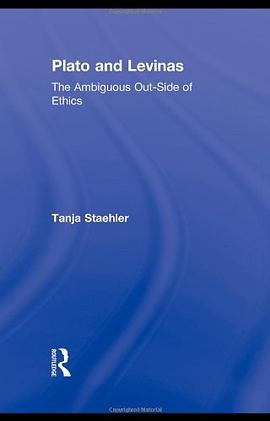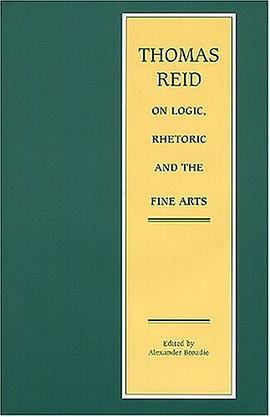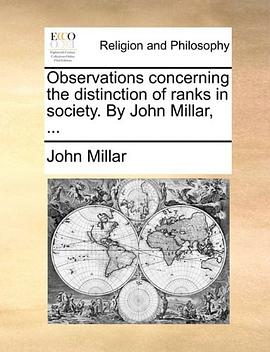

具体描述
In the second half of the twentieth century, ethics has gained considerable prominence within philosophy. In contrast to other scholars, Levinas proposed that it be not one philosophical discipline among many, but the most fundamental and essential one. Before philosophy became divided into disciplines, Plato also treated the question of the Good as the most important philosophical question. Levinas's approach to ethics begins in the encounter with the other as the most basic experience of responsibility. He acknowledges the necessity to move beyond this initial, dyadic encounter, but has problems extending his approach to a larger dimension, such as community. To shed light on this dilemma, Tanja Staehler examines broader dimensions which are linked to the political realm, and the problems they pose for ethics. Staehler demonstrates that both Plato and Levinas come to identify three realms as ambiguous: the erotic, the artistic, and the political. In each case, there is a precarious position in relation to ethics. However, neither Plato nor Levinas explores ambiguity in itself. Staehler argues that these ambiguous dimensions can contribute to revealing the Other s vulnerability without diminishing the fundamental role of unambiguous ethical responsibility.
作者简介
目录信息
读后感
评分
评分
评分
评分
用户评价
我不得不承认,《Plato and Levinas》这本书,在某些章节的阅读体验上,确实带给我不小的挑战。特别是对于一些形而上学的论述,以及伦理学中更为抽象的辩证过程,我需要花费比平时更多的时间和精力去理解。然而,也正是这种挑战,让我体验到了哲学思考的艰辛与魅力。当读到关于“时间”与“永恒”的讨论时,书中将普拉图对“时间”的消极看法,与列维纳斯对“当下”和“他者”的瞬息相遇的重视进行对比,我仿佛看到了两种截然不同的生命态度。普拉图的永恒,是一种超越流变的、稳定的存在,而列维纳斯的“他者”,则是在不可预测的当下,一次又一次地打破我们的惯性,迫使我们作出回应。这种对比,不仅仅是关于时间观的差异,更触及了我们如何把握生命,如何理解“活着”的本质。我开始反思,我是否也过于追求某种“永恒不变”的秩序,而忽略了生命中那些转瞬即逝却又至关重要的“他者”的召唤?这本书让我重新审视了自己对生命的理解,也让我看到了,即使是如此抽象的哲学概念,也能够如此深刻地触及我们最真实的生命体验,并引发对人生意义的更深层次的追问。
评分阅读《Plato and Levinas》的体验,是一种逐渐深入、层层剥离的过程。初读时,我可能更多地关注于书中所引用的普拉图的对话和列维纳斯的著作,试图理解他们各自独立的论点。但随着阅读的深入,我逐渐发现了作者在字里行间所构建的微妙联系,以及他对两者之间可能存在的张力与共鸣的巧妙处理。尤其是在探讨“语言”与“意义”的章节,我看到了普拉图对于“逻各斯”(logos)作为真理载体的强调,以及他对于语言作为知识传播工具的重视。而列维纳斯则更侧重于语言在“他者”的召唤中所扮演的角色,他认为语言的真正意义,往往发生在与“他者”的相遇中,发生在对“他者”的“应答”之中。这种对语言的不同理解,也折射出两位哲学家对“认识”和“沟通”的不同侧重。普拉图更倾向于通过理性的语言来把握永恒的真理,而列维纳斯则强调语言在构建人际关系、在回应“他者”的召唤中所发挥的不可替代的作用。这本书让我意识到,语言不仅仅是思想的工具,更是我们与他人连接的桥梁,是承载着伦理责任的载体。
评分《Plato and Levinas》这本书,在我看来,不仅仅是一部哲学著作,更像是一份关于如何“存在”的邀请函。它没有提供现成的答案,而是通过对两位思想巨匠的深入探讨,引导读者自己去寻找属于自己的答案。在书中,我看到了普拉图关于“爱”的上升螺旋,从对具体事物的爱,到对美的爱,最终到达对“善的理念”的爱。这是一种对超越的渴望,一种对更高层次存在的追求。而列维纳斯则将这种“爱”的指向,转向了“他者”,转向了我们与生俱来的、对“他者”的无限责任。他提醒我们,真正的爱,并非是基于索取或回报,而是一种无条件的给予和关怀。书中对于这两种“爱”的比较,让我思考,我们日常生活中所谓的“爱”,究竟是哪一种?是出于占有和控制,还是出于真正的尊重和关怀?这种对“爱”的深刻剖析,也让我更加理解,为什么列维纳斯会将伦理学视为“哲学的第一哲学”,因为正是这种对他者的爱与责任,构成了我们作为人的最基本的特质,也构成了我们与世界建立连接的基石。
评分《Plato and Levinas》这本书,对于我这样并非专业哲学背景的读者来说,更像是一次思想的“探险”。它并非提供一份现成的哲学地图,而是通过引导读者深入两位思想家的思想迷宫,去发现隐藏其中的宝藏。其中关于“身体”与“精神”的讨论,让我尤为印象深刻。普拉图将身体视为灵魂的囚笼,强调精神的解放与超越,而列维纳斯则将“他者”的“面孔”看作是一种可见的、触手可及的伦理显现,这种“面孔”就存在于具体的、有血有肉的身体之上。书中将两者对“身体”的不同理解进行对比,让我反思,我们是否也过于轻视了身体的伦理意义,而将注意力过多地集中在抽象的精神层面?列维纳斯对“他者”身体的敏感,对“他者”面孔的敬畏,让我看到了在最具体的、最日常的人际交往中,就已经蕴含着最深刻的伦理关怀。这种将“身体”重新置于伦理关怀中心的视角,无疑为我提供了一种全新的理解人与人之间关系的方式,也让我更加珍视那些在日常生活中,我们与他人身体相遇的瞬间,因为在这些瞬间,可能就隐藏着最真实的伦理召唤。
评分坦白说,在拿到《Plato and Levinas》之前,我心中曾有一丝疑虑:这两位哲学家真的有足够的交集之处吗?普拉图的理想国,其构想的理性秩序,似乎与列维纳斯对“他者”的全然开放和不设防的伦理要求,存在着某种张力。然而,深入阅读之后,我才逐渐体会到作者的用意所在。他并没有简单地将两者的思想并列,而是通过精妙的梳理和对比,揭示了其内在的联系与互补。尤其是在关于“爱”与“责任”的讨论上,普拉图对于“爱”作为一种上升的动力,一种对美的追求的阐释,与列维纳斯强调的“他者”之爱,一种源于责任的、非对称性的关怀,在我看来,虽然形式不同,但其核心都指向了超越自我、走向他人的某种内在驱动力。书中的一些分析,尤其是在探讨“善”的根源时,既回溯了普拉图的“善的理念”作为最高实在的地位,又将其与列维纳斯在“他者”面孔前所唤起的伦理冲动联系起来,这种联系是令人耳目一新的。它让我意识到,我们对“善”的理解,或许并非仅仅是对某种抽象原则的遵循,而更是一种在具体人际关系中,在与“他者”的相遇中,不断被唤醒和塑造的过程。这种对“善”的动态化理解,也让我对日常生活中的许多伦理困境有了新的思考角度。
评分我一直觉得,哲学最迷人的地方就在于它能让你从一个全新的角度去看待那些你习以为常的事物,而《Plato and Levinas》无疑做到了这一点。它不是那种读起来轻松愉快的书,其中涉及的概念相当复杂,需要反复咀嚼。但正因为如此,它带来的思想冲击才更加深刻。读到关于“正义”的章节时,我特别有感触。普拉图在《理想国》中对城邦正义的论述,强调的是各司其职、和谐有序,而列维纳斯则将正义的根源置于与“他者”的相遇之中,强调的是个体对“他者”无条件的责任。作者巧妙地将两者联系起来,探讨了在构建一个公正的社会时,我们如何在追求秩序和效率的同时,不忽视每一个“他者”的独特价值和尊严。这种平衡的探讨,让我不禁反思,我们现代社会所追求的“公平正义”,是否在某种程度上过于强调普适性和同质化,而忽略了“他者”的个殊性?这本书提供了一个宝贵的视角,让我们去思考,真正的正义,是否需要包含一种对“他者”的更深层、更个人化的回应?这种思考,对于我们理解当下的社会议题,以及如何在人与人之间建立更具尊严的连接,都有着极强的现实意义。
评分这本书带给我的,不仅仅是知识的增益,更是一种思维方式的重塑。在接触《Plato and Levinas》之前,我习惯于将哲学家的思想看作是某种独立的体系,他们各自构建自己的理论王国。然而,这本书让我看到了不同哲学思想之间,即使跨越千年,也存在着某种深刻的对话和张力。作者在梳理普拉图关于“美德”和“灵魂说”的观点时,常常会引申到列维纳斯对“主体性”的批判,以及他对“非对称性关系”的强调。这种梳理方式,让我意识到,我们对于“成为一个更好的人”的理解,或许并非仅仅是内在德性的培养,更是在与“他者”的互动中,在回应“他者”的召唤时,不断形成的。普拉图所追求的“有德之人”,其德性是否也需要在与他人的关系中得到体现?列维纳斯所说的“责任”,又是否是我们抵达真正“人性”的必由之路?这种将“内向的德性”与“外向的责任”进行辩证统一的尝试,让我看到了哲学思考的活力所在。它不是僵化的教条,而是鲜活的生命体验,是关于我们如何在这个世界上,与他人共存,并努力做得更好的一种持续的探索。
评分阅读《Plato and Levinas》的过程,更像是一场与两位伟大灵魂的深度对话。书中对普拉图“洞穴寓言”的解读,以及其与列维纳斯“他者”概念的关联,是我尤其印象深刻的部分。普拉图笔下的囚徒,挣脱束缚,看到太阳,体验到真实,这是一种从虚幻走向真实的认识论上的启蒙。而列维纳斯所说的“他者”,则是在我们沉溺于自我中心的世界时,突然闯入,唤醒我们内在的伦理责任,这是一种伦理上的启蒙。作者通过这样的类比,生动地展现了两种不同维度的“超越”。普拉图的超越是向上的,是对理型世界的追寻;而列维纳斯则将这种超越的方向指向了水平面的“他者”,指向了关系性的维度。这种对比,让我开始审视自己是否也同样被某种“洞穴”所囚禁,是否过于沉溺于自我的建构,而忽略了身边“他者”的存在?这本书让我明白了,认识世界的真理固然重要,但更重要的是,我们如何在与他人的关系中,在面对“他者”时,保持一份谦卑与责任。这种双重的超越,构成了我理解“存在”的全新维度,也让我对“启蒙”有了更深刻的理解,它不仅仅是知识的获得,更是心灵的苏醒,以及对他人生命的深切关怀。
评分初次翻阅《Plato and Levinas》的封面,就有一种难以言喻的吸引力。普拉图,这位西方哲学的奠基人,其思想的浩瀚与深邃早已为人称道,而列维纳斯,这位20世纪的伦理学巨匠,其“他者”的观念更是深刻地触及了存在的本质。将这两位看似跨越千年、风格迥异的思想家并置,本身就足以引发读者无限的好奇与探索欲。我并非是专业的哲学研究者,更多的是出于对人类思想史的兴趣,以及对“人之所以为人”这一终极问题的追问,而选择阅读这本书。在接触到这本书之前,我对于列维纳斯,虽有所耳闻,但对其思想的理解仍停留在较为表层,更多的是对其“他者”概念的某种抽象认知。而普拉图,更是如同遥远星辰般,其对话中的理念世界,虽然精妙,却时常让我感到一丝疏离,似乎与我此刻的生活经验有着难以跨越的鸿沟。因此,《Plato and Levinas》在我眼中,更像是一座连接不同思想岛屿的桥梁,我渴望通过它,去领略两岸各自独特的风光,更希望看到当这两岸的风景被同时纳入视野时,会激荡出怎样的智慧火花。这本书的出现,恰好填补了我对于这种跨时空对话的期待,也让我有机会在更广阔的哲学背景下,重新审视那些关于正义、关于善、关于我们如何与他人建立联系的古老议题。
评分总而言之,《Plato and Levinas》这本书,给我的哲学阅读体验带来了前所未有的深度和广度。它成功地搭建了一个对话的平台,让两位思想巨匠的思想在碰撞中产生了新的火花。它挑战了我既有的认知,也拓展了我对许多哲学概念的理解。我从这本书中看到的,不仅仅是关于“存在”、“正义”、“爱”、“责任”等抽象的哲学探讨,更是一种关于如何更好地“为人”的深刻启示。它让我意识到,哲学并非遥不可及的理论,而是与我们日常生活紧密相连的实践。我感谢作者的辛勤付出,他以一种充满智慧和洞察力的方式,为我们揭示了普拉图与列维纳斯思想中那些触及人类存在核心的共通之处,以及他们之间微妙的张力与互补。读完这本书,我并没有感到所有的问题都得到了解答,相反,我感到自己开启了更多新的追问。这正是一本优秀哲学书的魅力所在,它激发了我们的思考,引导我们踏上了一条永无止境的探索之路,去理解人类思想的深度,去探寻生命存在的意义。
评分 评分 评分 评分 评分相关图书
本站所有内容均为互联网搜索引擎提供的公开搜索信息,本站不存储任何数据与内容,任何内容与数据均与本站无关,如有需要请联系相关搜索引擎包括但不限于百度,google,bing,sogou 等
© 2026 book.wenda123.org All Rights Reserved. 图书目录大全 版权所有




















